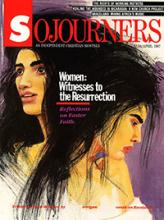It was Mary Magdalene and Joanna and Mary the mother of James and other women with them who told this to the apostles; but these words seemed to them an idle tale, and they did not believe them. - Luke 24:10-11
Luke's account of the Resurrection begins with a group of women coming together early in the morning to prepare the body of Jesus for burial. It is a portrait of women doing "women's work," as is the case with women in so many times and places, taking on certain drudgeries and unpleasant responsibilities that always seem to fall upon women.
The only men present are extraordinary figures donning shining garments. They explain the open sepulcher and the missing corpse by reminding these female followers of Jesus of the words he had spoken to them in Galilee concerning his Crucifixion and Resurrection from the dead.
The women give a report to the 11 remaining apostles and others who were with them, but their words are dismissed with disbelief as an "idle tale." However, the women's report does merit an immediate official investigation of the evidence by a man - ironically Peter - who somehow now emerges as a reliable, responsible witness, notwithstanding his forthright denial of Christ at the time of his suffering. And men have doubted the authority of women's telling and interpreting of the truth of God's Word ever since.
Indeed the report of the Resurrection was no idle tale; the Bible tells us that the risen Christ made numerous appearances to his male followers to rebuke them for their ignorance and unbelief. Today, as then, there are many who would deny the possibility that a person could be raised from the dead, others who would seek to "demythologize" the Resurrection, and still others who would question the rationality of anyone, whether in the first century or today, who would dare to receive and believe this event as life-changing good news.
Read the Full Article

